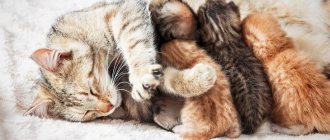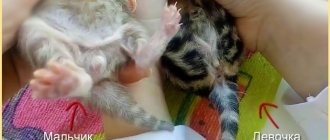“If a person does not love animals, he will never love people,” so says popular wisdom. Everyone chooses their favorite pet according to their preferences. Some people prefer dogs, others prefer cats, and others prefer parrots. In this article we will tell you how to choose a kitten, based on the advice of experienced felinologists, so that it becomes a beloved family member for many “cat” years.
How to choose a kitten for your home
Before you buy a baby, you should understand and explain to all family members that you are not buying a toy, but a living creature. It will require care and self-love over the next 15–20 years. An important question is the purpose of purchasing the animal:
- beloved home friend ;
- future participant in various competitions and professional exhibitions;
- business object - breeding a certain breed.
Depending on this, you can choose a purebred or a regular mongrel kitten. It is clear that in the first case any animal will do, but the second two problems can only be solved with a purebred kitten.
Ordinary kittens without a pedigree are more hardy and do not require special attention while growing up. You can meet such a kitten on the street and bring the pet you like into your home. For a purebred kitten you will have to pay a considerable amount, which varies depending on the breed.
You must also decide on the gender of the kitten. If you have no desire to tinker with offspring, choose a male.
Kitten care
Before purchasing, make sure you can handle raising a new family member. In addition to feeding, playing and grooming, you will have to take care of regular trips to the veterinarian.
What will your baby need?
To move to a new home you will need a carrier. You will also have to use it during trips to the veterinarian or other movements around the city. It is better to choose a house with a plastic bottom and for growth - it is quite possible that an older cat will go in it for sterilization/castration, routine examinations and even exhibitions.
Purchase two bowls in advance - for food and water. It is safer to buy ceramic or metal products, since they will not turn over or move, and they are easier to wash than plastic ones.
In addition to the tray and filler, be sure to take diapers. Be patient while your cat gets used to the litter box, and don't scold him if he makes mistakes.
You will also need to build a personal space. Choose a quiet corner and place a bed or soft house there. Remember that cubs are very active, so stock up on mice, “teasers” and balls. It is better to put wires and other rope-like things away so that the cat does not become interested in them.
To sharpen claws, it is better to choose 2 options: horizontal and vertical claws. You can only find out which of these your pet prefers after the fact.
Maintenance cost per month
Monthly expenses are individual, as it all depends on the preferred brands of food and the prestige of the chosen veterinary clinic.
For the first time, it will take about 4 thousand rubles to buy all the necessary things. This amount includes the carrier, bowls, tray, bed and scratching post. Every month you will have to buy food or natural products and a small package of filler. This will be approximately 1-2.5 thousand rubles per animal.
Sometimes costs may increase. This happens during planned visits to the veterinarian, sterilization and treatment of the disease. The pet must also be treated quarterly for worms. Pets that roam outside will need a flea collar.
Which kitten to choose – purebred or outbred
It is worthwhile to dwell in more detail on the advantages and disadvantages of each option. Purebred kittens are accustomed to handling and interacting with humans, so they are easier to socialize. Breeders strictly monitor the health of male cats. Therefore, purebreds, as a rule, do not have congenital diseases. Pedigree cats have a wide variety of choices. You can always choose the breed according to your personal preference. Among purebred breeds there are hypoallergenic breeds.
Ordinary kittens have stronger immunity and an excellent hunting instinct. If you need a mouse hunter, it is better to choose a regular kitten. They can live in any conditions, both in a private house and in an apartment .
When deciding which kitten is better to choose, you should analyze all the pros and cons of each option. In any case, with the right choice and upbringing, the kitten will grow up to be a true family friend.
Unusual cat breeds
For you, is a cat not only a pet, but also a way of self-expression? Take a closer look at unusual cat breeds. This is where you should choose to suit your taste!
Cats with original appearance
There are people who want to be unique even in choosing a pet. If you want your friends to admire your cat, take a closer look at these breeds:
American Curl
Curly curled ears
Devon Rex
A cat with the appearance of an alien
Cornish Rex
Curly fur and graceful posture
Laperm
Pet with large curls
Munchkin
Cute cat with short legs
Peterbald
An elegant cat with smooth skin.
Cats with an unusual appearance will also delight you with a wonderful character. Some of these breeds are not cheap - but you can overpay for such pleasure!
Resembling wild cats
Some people want to bring something exotic into their normal lives: bring home a real leopard! However, a leopard is a dangerous undertaking. Then choose a domestic cat breed in a wild shell:
Bengal cat
Domestic inquisitive leopard
Bombay cat
Black panther with a homely disposition
Ocicat
A mischievous fidget with the appearance of a wild cat
Savannah
An African animal for your home
With such cats you feel like you are in the jungle: their unusual appearance contributes to this. All breeds, except the Bombay, truly have wild roots.
What breed of kitten to choose
If you decide to buy a purebred kitten, experts advise visiting several exhibitions to see what your pet will look like when it grows up. Perhaps you will change your mind and opt for a completely different breed.
Exhibitions are often accompanied by the sale of animals. But buying a kitten at an exhibition is not a very good decision. The animal can get sick and cause a lot of unpleasant moments from the very beginning. It is better to make a purchase directly from the breeder, having assessed the conditions in which the animals are kept. This could be a nursery, a club or a private specialist.
Kittens born at home get used to the house faster. And, on the contrary, those kept in enclosures are a little more difficult to adapt to new conditions. A conscientious breeder always knows everything about his pets. He will always share with you all the information he has.
Felinologist's advice: animals, like people, are not without shortcomings. But the degree of pedigree of the kittens and their future career at exhibitions depend on their number.
A purebred kitten must have a passport describing its pedigreedness and information about the pedigree of its parents. Having only a veterinary passport only guarantees the health of the kitten. But such an animal is not suitable for breeding. Ideally, it is advisable to look at the kitten’s parents, their external characteristics, behavior (the presence of aggressiveness or excessive passivity).
In professional clubs, pets have a registration card, which is proof that the kitten meets all pedigree standards. If the kitten does not meet the standards, the expert will not issue such a card. The card also contains the name of the kitten and its parents, as well as their pedigree numbers.
What determines the cost of kittens?
Officially, purebred kittens are divided into three categories:
- Pat (Pet);
- Breeding;
- Show class (Show).
Show class – the best representatives of the breed, potential exhibition winners and valuable genetic material. These kittens are the most expensive. Taking such a pet for castration is unwise from a financial point of view and sad for the gene pool of the breed.
Most often, kittens of the breeding class are sold - a strong middle class. These cats can participate in breeding because they have no obvious defects and have all the breed qualities.
The kitten must have a pedigree (4 generations), regardless of what class it belongs to.
Don’t rush to buy a purebred baby at an attractively low price “without documents”, “unscheduled mating”. Most likely, such breeders want money, not improvement of the breed.
Recommend: Cat Parasites
A cat should not have more than 3 litters per year, while home-grown breeders give birth to kittens at 1-2 months and receive litters from the female 4-5 times a year. Such babies cannot be strong and healthy and often suffer from rickets.
Buying a kitten cannot be an “urgent” matter. It’s better to wait a few months “in line” at a good cattery than to take just any kitten.
How to choose a healthy kitten
Regardless of the breed, there are several criteria by which you can evaluate the health of a kitten. Examine the kitten carefully. In a healthy baby:
- The eyes are clean, clear, without discharge, and do not water.
- The ears do not emit an unpleasant odor, do not have redness or black crusts.
- A healthy kitten's nose is clean, without discharge or wounds.
- The coat is clean, shiny, without dandruff and pellets, without an unpleasant odor.
- Breathing without whistling.
- The skin is clean, without wounds.
- The tummy is normal (a swollen one may indicate the presence of worms).
- The oral cavity is without an unpleasant odor, the teeth are white and clean.
Look under the tail too. A healthy animal has no signs of diarrhea or worms. The kitten should not sneeze, be playful, without aggression. He should be of normal weight, not fat or thin.
A felinologist's advice: if you see scratches on a kitten's neck, do not rush to get scared. Most likely these are marks from the mother's teeth.
You should not buy a kitten if it is less than 2-3 months old. By this time, he is already gaining independence and will cause much fewer problems.
Health
Now we have reached the most important point - how to choose not only a beautiful and interesting, but also a healthy kitten. Of course, if you buy a purebred animal from a trusted nursery or from reliable breeders, the likelihood of problems occurring is minimal. But, if your choice is one of the many online advertisements, when you first meet a kitten, you should carefully examine it.
The following points should raise suspicions:
- unhealthy (sloppy) coat appearance and the presence of fleas;
- dry hot nose;
- discharge from the ears with an unpleasant odor;
- painful, non-shiny eyes, the presence of purulent discharge (for some breeds, clear tears are the norm);
- a hard or too large belly (this may indicate illness, poor diet, or the presence of helminths);
- signs of diarrhea under the tail (inflammation, matted fur, fecal residue).
Remember, kittens at the age of 3-4 months have a confident gait. They are active and playful during periods of wakefulness and always respond happily to any treats.
How to choose the right kitten
As mentioned above, an experienced breeder will not sell a kitten that is under 12 weeks old. By this time, the baby leaves his mother and knows how to take care of himself and hunt independently. You need to ask whether the animal has been vaccinated. The first vaccination is given at 8 weeks, the second at 11 weeks. The kitten must undergo treatment for external and internal parasites. All this is reflected in the veterinary passport.
Kittens that are raised apart from their mother and their siblings are likely to have behavior problems in the future. Life in a family teaches you how to behave with others. Such kittens understand much faster that they should not scratch or bite without a reason. This is even more acute when the kittens have no experience communicating with humans. They will be more inclined to play aggressively.
Age
When planning to bring a pet into your home, it is important to know not only how to choose a kitten (girl or boy), but also at what age the baby should move to a new place of residence.
Important! Veterinarians recommend adopting kittens to a new family between 3 and 4 months of age.
It is believed that a kitten is quite ready to move if:
- the weaning process has been completed and the baby has become accustomed to special foods;
- the first vaccinations have been made and after them the period necessary for the formation of immunity has passed;
- at the very least, he has successfully started getting acquainted with the litter box (babies learn this skill better from their mother).
If a kitten is taken too early, a variety of consequences are possible:
- illnesses (after all, up to 12 weeks, kittens’ immunity has not yet been formed);
- behavioral disorders (remember that separation from family is also stressful for the baby);
- problems with food and tray.
Naturally, no one forbids you to visit breeders or a nursery and choose your baby much earlier. In this case, the kitten will be tagged and you will be able to monitor its development and progress until it is completely ready to go.
Pre-orders are even possible for elite kittens from award-winning parents. You can agree on the purchase of a baby while the cat is pregnant.
How to choose a kitten by character
It is largely determined by the breed of the animal. If there are small children in the family, then it is better to choose a kitten with a calm character that can withstand all the children’s pranks . Pay attention to the Russian Blue, Siberian breed or Maine Coon.
The Siamese, Bengal, and Abyssinian breeds are considered the most playful and sociable. Breeders claim that in terms of sociability they are not inferior to dogs. If you want a cat that can tolerate being alone, then choose a British Shorthair. These kittens are very independent, but at the same time they love their owners dearly.
Sometimes the reason for not purchasing a pet is an allergy to cats. In this case, you can choose a hypoallergenic breed. These include cats without hair - sphinxes.
Moreover, each animal has its own character. If you love your pet and show friendliness, he will definitely answer you in kind.
Character
When you first meet him, do not rush to draw the kitten’s attention to yourself, pick him up or stroke him. Stand a little away and watch how the baby you like behaves in a natural environment for him. Cats, like people, have different personalities:
- mischievous and inquisitive;
- persistent and demanding;
- timid and indecisive.
Remember that it is impossible to change temperament. Having taken an active, loud and constantly demanding attention to your person, you must satisfy his needs for communication. At the same time, one should not expect constant readiness for games and communication from a calm, cowardly and phlegmatic animal.
How to choose a kitten by behavior
It is by this that one can judge the personality of the kitten. When choosing, pay attention to how he behaves with other kittens. He should not be aggressive or terrorize other kittens. It’s not very good if the baby huddles in a corner and doesn’t make contact. The sociable cat is inquisitive and never resists making acquaintances.
If a kitten hisses when people approach, then in the future it will not respond well to training. It is not very good if the animal bends when it is stroked on the back. On the question of how to choose an affectionate kitten, felinologists agree on one opinion: a friendly kitten who happily responds to play and acquaintance will definitely grow into a kind adult cat.
Felinologist's advice: taking into account professional advice, do not forget about your heart. As a rule, it tells you at first glance which animal you should choose. Trust your feelings.
When assessing a kitten's behavior, you should also take into account that in childhood they either frolic or sleep. They do not have intermediate states. Take a toy with you, for example, a bow on a string. A playful kitten is sure to pounce on the toy.
Where is the best place to choose?
The first question that arises after deciding that there will be a new tenant in the house is where to get a pet. There are many options for purchasing furry happiness.
On the street
Realizing that the house is empty and uncomfortable without a purring creature, you can take a kitten from the street. Often, animals find their owners themselves: a new owner can find them near his door, leaving the entrance or taking a helpless baby from the paws of dogs. If you are not afraid of the difficulties of adapting a street vagabond to a new home, then such a noble and responsible act deserves respect.
Often foundlings grow up to be the most loyal and affectionate. When taking an animal into your home from the street, you must have free time, desire and opportunity to improve its health, make repeated visits to the doctor for vaccination, treatment of chronic diseases, and subsequent sterilization.
It will take some effort to teach a new resident how to use the toilet and the rules of good manners in apartment living conditions. For a person with a busy work schedule, this option of purchasing a pet is unacceptable.
We recommend reading about how to tell a male cat apart. You will learn how to determine the sex of a newborn kitten at one month of age, gender differences in habits, and coloring. Here's more about how cats mate.
From hand
In the event that the future owner does not care that his pet will not be of noble blood, but an ordinary yard cat, you can look for a new friend from acquaintances, friends and relatives. In this case, there is a chance to have a healthy animal.
Many domestic outbred cats have a good disposition and are not inferior in their friendliness to their purebred relatives.
If you are puzzled about how to choose a kitten for your home, you should take into account that its character and manners will depend on the place of its former promise. Every child needs to be dealt with. However, if he is already socialized and grew up in a family, then upbringing becomes a little easier.
Shelters
In large cities you can visit shelters for homeless animals.
Often there you can meet a purebred cat that, for some reason, turned out to be unwanted by its previous owners or got lost on the street.
Our staff will help you choose an animal, knowing its character, disposition, and habits well. If the new owner decides to adopt a pet from a shelter, the first thing they should do is visit a veterinarian for an examination and determine the health condition.
Bird markets
Bird markets are popular places to purchase pets in big cities. A huge variety of kittens and adult animals of all colors and breeds can be found in such places.
You should be careful when purchasing, since often the sellers are resellers for whom animals are a commodity. In this regard, there is a chance to purchase an unhealthy kitten or one that does not correspond to the declared breed. Immediately after purchase, it is also worth visiting a veterinarian to identify “hidden” pathologies and begin their treatment in a timely manner.
In the nursery
If the owner does not want to have a yard animal, he is interested in how to choose a purebred kitten in the nursery. The best option is to contact directly the breeders involved in breeding cats of a particular breed. You can talk to them about the breed you want, about the temperament of the pet you like.
There is more than one such establishment in a large city. Having studied the nursery's website, you can find out about the direction of breeding work, planned matings, and see photographs and data of the parents of the future pet. Purchasing a kitten from nurseries eliminates the risk of purchasing an outbred animal passed off as a valuable and rare breed.
Cats from the Norwegian Forest Cat Cattery
Specialized institutions value their reputation and prepare kittens before sale: they carry out deworming, vaccination, and socialize young animals. Moreover, in this case, the chances of taking a healthy baby are much higher.
Before choosing a good kitten, you can visit a cat show. Such events are useful in terms of obtaining information about a particular breed. The future owner can see live cats of the breeds he is interested in, ask the price, learn about the characteristics of the breed line, talk with breeders and, possibly, buy the baby he likes.
You can decide where to adopt a kitten or an adult cat after a little analysis of the following factors:
- financial capabilities;
- availability of sufficient free time;
- aesthetic preferences;
- character and temperament;
- presence of children in the family.
How to choose a name for a kitten
The name of a purebred kitten is indicated in the passport, so you buy a kitten with a ready-made name. If the kitten is purebred, but will not participate in exhibitions, you can choose a name for it yourself.
When choosing a name, you should follow several rules:
- It should contain 2, maximum 3 syllables for ease of memorization.
- It is better if the name contains whistling sounds “s”, “z”, “ts”, reminiscent of the squeaking of rodents.
- You should not use hissing sounds “sh”, “zh”, “ch”, “sch”, which cats perceive as hissing and a sign of aggression (it is better to dilute these sounds with purring “m” and “r”).
The kitten should not be called by a human name. You can pay attention to his external data or character, which will help you choose a name.
Cats have been the most popular pets since ancient times. Knowing how to choose the right kitten, you can choose the baby of your dreams. He will definitely become a friend of your family and will bring many unforgettable moments of happiness. The main thing is to be friendly and affectionate with your pet, and the kitten will answer you in kind.
Floor
A cat or a cat is an eternal question to which there is no clear answer. It all depends on your preferences, character, lifestyle, and the presence of other cats in the apartment.
It is worth noting that among representatives of both sexes there are both gentle and affectionate and those who show aggressiveness, both phlegmatic and cheerful, both sociable and those who love solitude.
Before making your choice of owl, we suggest that you familiarize yourself with the positive and negative points noted by breeders.
Cats
| pros | minuses |
| + no problem with kittens + More often than cats, they are sociable and gentle + Representatives of rare breeds are paid well for mating | — instincts force the cat to mark territory — odor caused by hormones — two cats rarely get along in an apartment |
Important! The problem of unpleasant odor that appears after a cat reaches puberty can be solved by sterilization.
But not all owners are ready to take this step. Moreover, it is important to know that for purebred animals, sterilization will close the way to exhibitions, and many breeders sell top-class babies only on the condition that the animal participates in breeding.
Read on for more details on how to choose a healthy purebred boy kitten.
Cats
| pros | minuses |
| + cleanliness + less than cats need communication + less noisy and demanding than cats in everyday life + purebred kittens are quite expensive | — kittens (if this is not desired) — loud period of “concern” every 3-4 months — Sometimes cats can be aggressive due to hormonal changes |
Important! Sterilization of a cat is also possible, but this is a more traumatic abdominal operation than for cats, after which the animal will take a long time to recover.
You can solve the problem of “preoccupation”, during which cats are extremely loud, in other ways:
- by arranging for your pet to meet a cat (of course, if you want kittens);
- by purchasing special hormonal drugs on the recommendation of a veterinarian that will help eliminate unwanted symptoms.
Useful tips
After the new owner of the kitten has decided on his choice, discussed all the issues of interest to him with the breeder, showed the animal to the veterinarian and finally brought it home, he will need to arrange a new home for the baby.
- When purchasing a pet, you should think in advance where it will sleep. From the first days in a new home, the baby should feel comfortable;
- It is necessary to take care of toys for the kitten. You can not only buy a toy, but also make it yourself. Perhaps at first the baby will miss his mother. Of course, a mouse or a fishing rod will not be able to replace the loss, but, in any case, the fluffy will be distracted from sad thoughts by a fun game with the owner;
- You can ask the breeder what combs he uses to care for the baby’s mother’s fur and purchase the same one;
- You should not sign your pet up for neutering in the first weeks. Despite the fact that doctors recommend doing this at an early age, you should wait a couple of weeks. The animal is already in a state of stress due to separation from its mother. You need to give him time to get comfortable, to feel that he is loved, and he is in good, kind hands;
- The owner should surround the baby with care and attention. Don't scold him for little pranks or mistakes. This way, the friendship that arose in the first days can develop into true love between the cat and its new owner.
Tags: good to know, advice
Different prices for kittens: main reasons
Pet class kittens are the cheapest. The higher the category, the higher the price tag will be. The first thing included in the price is the breeder's expenses. He needs a good pair that will produce healthy offspring, the cost of which is at least 120 thousand rubles.
Next, you need to feed the kittens, provide them with proper care, prepare documents for the pedigree, and get vaccinations. You need to recoup the costs within 3-5 years, because this is the maximum period during which it is recommended to obtain offspring from a cat. It is also prohibited to allow more than 2-3 litters per year, because the animal’s body must recover after childbirth and lactation.
The price is also influenced by the nursery's reputation, class, and pedigree. People line up for popular breeders, and he can decide what price to set. The cost is often influenced by the rarity of the color or the structural features of certain parts of the body. For example, a fold-eared kitten costs more than a straight-eared one.
Temperament
Animals also differ in their disposition. It is a common belief that cats gradually adopt the behavior of their owners and become similar to them. At the same time, purebred pets also have natural character traits. It has been established that Siamese breeds are evil and vindictive from birth. In contrast, Persians are distinguished by kindness and lack of irritability.
The atmosphere in the house and habitat play an important role in shaping a pet’s character. For example, pets sleep much more than their street relatives. Among other things, it is generally accepted that large cat species have greater endurance than small breeds.
If you find an error, please select a piece of text and press Ctrl+Enter.
Share:
General tips for choosing a pet
To decide which kitten is best to choose, experts advise adhering to the following recommendations:
- First of all, decide on the breed that best matches the image of the future pet, taking into account the specific living conditions.
- The new family member must be at least 12 weeks old .
- The future owner should decide on the gender of the pet. It is believed that cats are more affectionate and sociable, and cats have an independent character. Keep in mind that spaying a cat will cost significantly more and require more post-operative care than spaying a male cat. When purchasing a cat, the owner may encounter such an unpleasant phenomenon as leaving marks. The problem is solved by early castration.
- Socialization of a kitten . It is desirable that the future pet be properly raised by its mother cat and not be afraid of people. With such a baby there will be no problems with raising and teaching good manners.
- Health status is an important factor when choosing. It is worth considering that if a baby is purchased “from hand” or picked up on the street, then it is imperative to show it to a doctor. Before family members have time to become attached to the new resident, it is better to find out about all hidden diseases. Unfortunately, sometimes they can be incompatible with life or pose a threat to household members.
We recommend reading about how to train a cat. You will learn about the optimal age of a pet for training, rules for working with an animal, tricks and commands that can be taught. And here is more information about how many times a day to feed a cat.
Coat color and character of the cat
There is a direct connection between the color of a cat's fur and its disposition. For example, black animals are considered to be very curious and independent. Black and white pets are usually sociable, talkative and loyal to their owners. Animals with tiger colors or stripes do not tolerate violation of their territory. These cats are a little wild. Red pets love the comfort and warmth of a homely atmosphere. They don't like to rush, and are very kind to people. White cats are considered finicky and easily offended.
Appearance
An integrated approach will help you make your choice. Sounds like a medical examination. In reality, everything is much simpler. It will take a keen eye and just a couple of minutes to determine the kitten's health status. At least superficially. There is no doubt that some congenital diseases appear in cats and kittens at an older age. But that’s where fate takes a turn.
- Wool (if any). Smooth, clean, with a healthy shine. No tangles or bald spots.
- Leather. Pink or gray depending on the color. Smooth, velvety, soft. No wounds, scratches or rashes. Small scratches are allowed on the neck, just below the back of the head - this is the mother cat still dragging the kitten by the scruff of the neck in her teeth.
- Ears. Clean, without sebaceous accumulations, dirt and black (sometimes brown) spots. Shouldn't smell bad.
- Nose. Damp and cold, but not very wet (as if there were snot).
- Eyes. Shiny, transparent, without cloudy haze. Absence of suppuration and tear streaks. In breeds with a deep bridge of the nose, drips are allowed; this is their feature.
- Place under the tail. Clean and dry, without stains or pellets on the coat.
- Skeleton. Strong, dense. Paws and tail without curvature. No lameness.
- Teeth and gums. Pink color, without spots or wounds. If there are no teeth yet, then the baby cannot be taken away. He's too small.
These are the main external signs by which you can easily determine whether the kitten is healthy or already sick.
By the way, some sources strongly recommend examining your baby for fleas. This is not the worst disadvantage to give up a kitten. Insects can be dealt with quickly and easily. Fortunately, the veterinary industry now offers a great variety of care products.
Advice. Be sure to touch the tummy of the chosen kitten. It shouldn't be swollen like a ball. Or vice versa, sunken. These are not direct signs of the disease, but they are already a reason to think about it.











